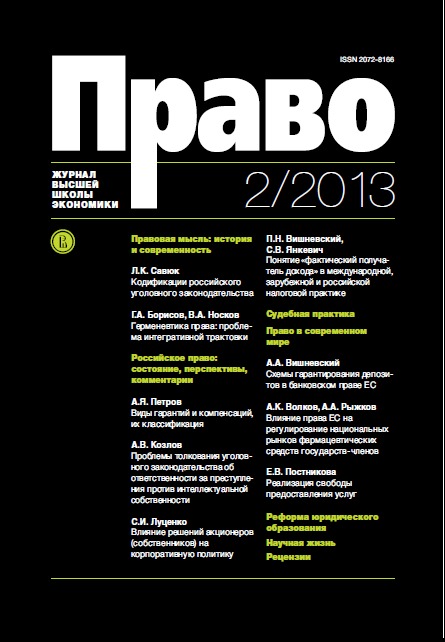Influence of Shareholders’ Decisions on Corporate Policy
Abstract
Lutsenko Sergey - Consultant of the Control Department of the Presidential Administration of Russian Federation. Address: 8/5 Staraya Ploshchad, Moscow, 103132, Russian Federation. E-mail: scorp_ante@rambler.ru.
The article studies the decisions of shareholders and the influence of the decision-making process on the corporate policy. Due to the discretionary powers, shareholders can participate in the management of the company directly. On the other hand, due to the absence of professional skills it can delegate this responsibility to the company’s management. Thus, conferring powers to the management, the shareholder can incur losses. Russian companies are prone to conflicts between shareholders and management. The reason of such conflicts is a high remuneration to the executives. The directors fix high payments for themselves acting ultra vires. Distributing the remunerations is a prerogative of general meeting of shareholders. Serious conflicts in the Russian companies can arise among shareholders. The aim of the disputes is the control of cash flows in the company. Resolving conflicts among shareholders of the company and directors may be achieved by the model of business target-setting. To create motivation within the board, shareholders initiate options in the company, thereby, matching the payment to the directors to concrete results of the company (increase in the profitability of assets, capitalization of the company’s value, increase in productivity). One of the primary goals of the corporate right is providing balance of their legitimate interests between shareholders and management of the company which, in turn, is reached if the parties are guided by the interests of the company, instead of short-term personal interests. Avoiding conflicts, is possible creating mechanisms facilitating to regulate the activity of the directors and make recommendations, arranging supervising services which would trace legitimacy of the transactions made by the directors. The purpose of the analysis is to identify relations among shareholders and between shareholders and the board. In particular, the following issues will be covered: aspects of general meetings (decisions to increase capital stock, a preemptive right to acquire of shares), high remuneration to the executives (arranging stock options). Research of the decisions of shareholders on the corporate policy is accompanied with case practice.

